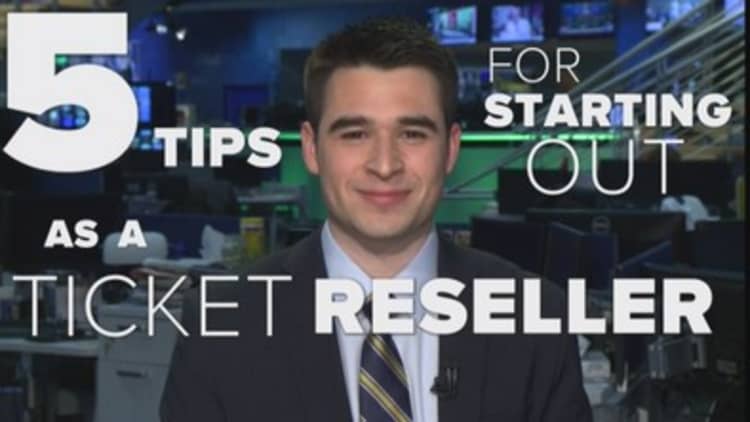You really want to go to that concert. You really, really want to go to that game. But by the time you find out about it, it's sold out and tickets on the secondary market are double what you could've paid in the first place. It's perhaps the most frustrating aspect of any ticketed event, aside from the $20 beers.

Say you were one of those lucky fans who had the foresight to buy tickets right when they went on sale. Nowadays, anyone can tell immediately how much their tickets can fetch thanks to prices on "fan-to-fan marketplaces" such as Stubhub and eBay. Yet from the looks of how many tickets are posted on secondary markets, it's hard to believe it's only fans posting tickets for sale.
That's because the U.S. ticket resale market is big business, booming to $5 billion dollars, according to numbers from Northcoast Research, an institutional equity research firm, as even leaders in the primary market such as TicketMaster, a unit of Live Nation Entertainment, have entered the space.
Take singer Ed Sheeran's recently posted concert scheduled for May at the Barclay's Center in Brooklyn, for example. Minutes after pre-sale tickets were made available for purchase to fan club and American Express members, more than 4,000 tickets were posted for resale on StubHub. Nearly a fifth of the tickets for AC/DC's show in Foxborough, Massachusetts, wound up on StubHub the day after they were posted.
Read More Bruised UFC may be getting into fight of its life
StubHub, like its competitors, emphasizes that it is a not a seller but an open marketplace that protects buyers and sellers, "ensuring everything is authentic," the company told CNBC. There is no federal law regarding ticket scalping in the United States, and StubHub encourages sellers to adhere to local state regulations in its terms of service.
Those state laws vary a great deal, and they're often only loosely enforced or haven't been updated for years. (According to Indiana law, for example, it is illegal to charge above face value for tickets to any "sparring match" or "semiprofessional elimination contest.")
Some states have laws restricting resale only on the physical grounds of an event. And other laws have been discarded. Minnesota, for instance, repealed its scalping law from 1963, making all ticket reselling legal in 2006.
"Ticket legislation is a complicated issue," said professor Gregory Stein, associate dean at University of Tennessee College of Law. "Laws tend to get support when they protect the consumer. Here the issue is much cloudier. Consumers could be on both sides, because one day you might need to sell tickets and others you might want to buy them."
The lines are blurring between a professional scalper and someone who sells their tickets. Back in the day brokers would have to fax each other updated inventories. Now that information is readily available to sellers online.Will Flahertydirector of growth and communications, SeatGeek
According to a StubHub representative, the average number of listings per user and the number of high-frequency sellers have both risen over time. Instant PDF ticket exchanges introduced on the platform around 2007 removed shipping barriers for many sellers, making it nearly instantaneous to turn a profit.
"The lines are blurring between a professional scalper and someone who sells their tickets," said Will Flaherty, director of growth and communications at SeatGeek. "Back in the day, brokers would have to fax each other updated inventories. Now that information is readily available to sellers online."
Jason Barash, founder of retail ticket broker Center Aisle Tickets, is a living example of that blurring line. He was unemployed in 2009 and started buying and reselling tickets online. Fast-forward to today, and Jason has two partners, boasts 20 percent returns on his ticket sales, and lives comfortably off his revenue.
Read MoreNFL: The nonprofit that's anything but
"I'm my own boss now, but there's no real secret to it. You just have to know the markets, and that takes a lot of time and work. One act that's good in New York might not be good in Texas," he said.
Stumbling into the resale business like Jason did makes sense. A fan noticing he made a profit reselling a ticket to a concert may do it again. TickPick, a rising StubHub competitor, may not have come to be if not for a similar case. Co-founder Brett Goldberg got attracted to resale after noticing he could fund his own Red Hot Chili Peppers tickets by selling a couple on the side.
"I joined their fan club and would buy four tickets every time, sell two and have two at no cost to me," he said. And after noticing a lack of buyer input on pricing with sites such as StubHub, he dropped his finance job to build TickPick, where buyers can post their willingness to pay.
"I guess that's how TickPick came about," he said. "I became so bad at selling I just wanted to unload them for whatever I could get."

New software has complemented the advances in marketplaces to make scalping even easier for people entering the business.
TicketUtils is one such software package that posts and pushes ticket inventory to multiple resale markets. If a broker's ticket sells on one site, duplicate listings are automatically deleted to avoid selling the same ticket twice. Nearly 90 percent of all the tickets posted to eBay come through TicketUtils, according to the software firm.
While TicketUtils concedes that the majority of its users are professional ticket brokers, it has a lot of users who resell on the side. TickPick data reveals that about 33 percent of its sellers have more than 100 ticket listings, yet the top 1 percent of its sellers provide over half the site's inventory.


